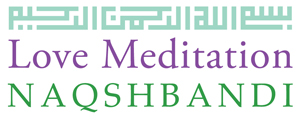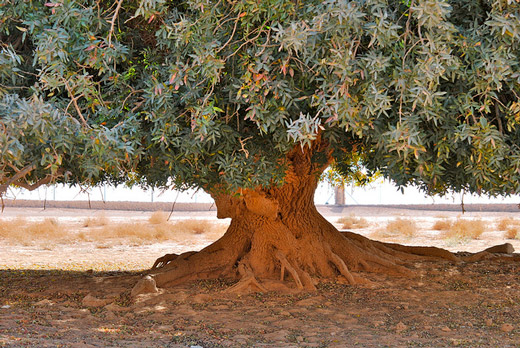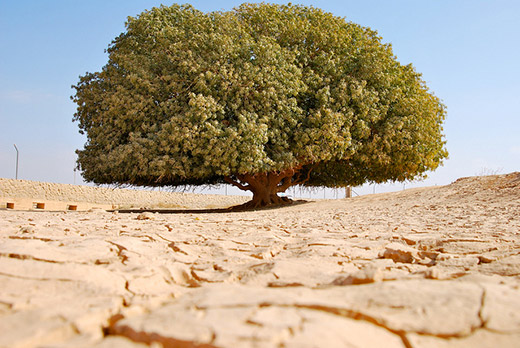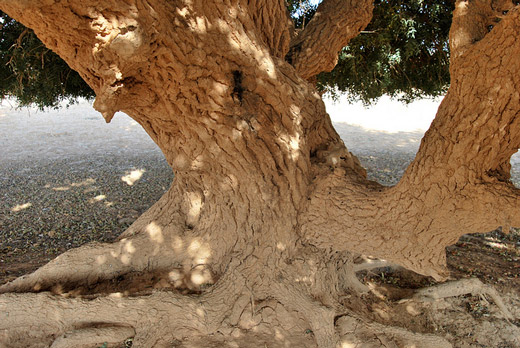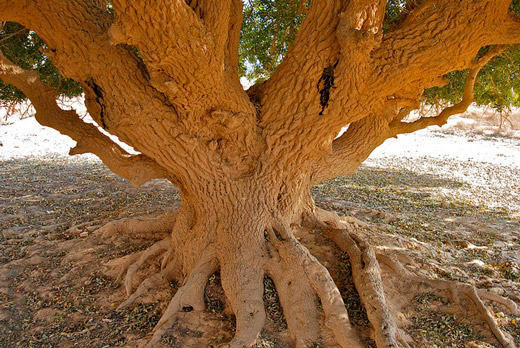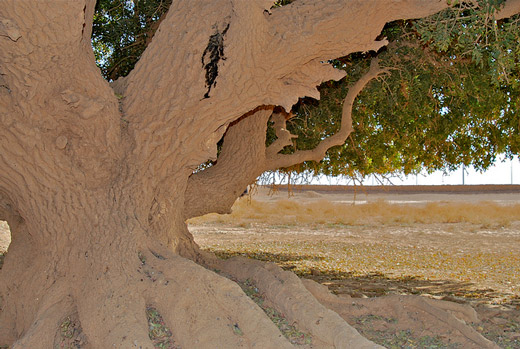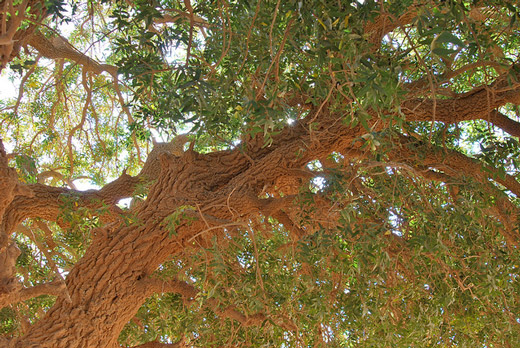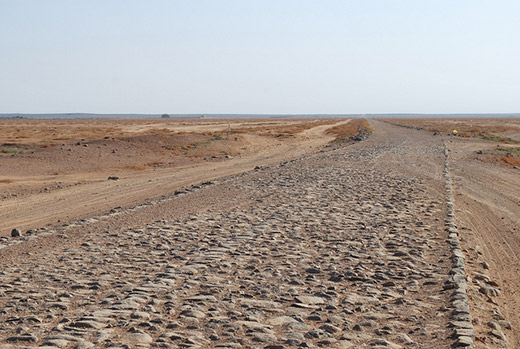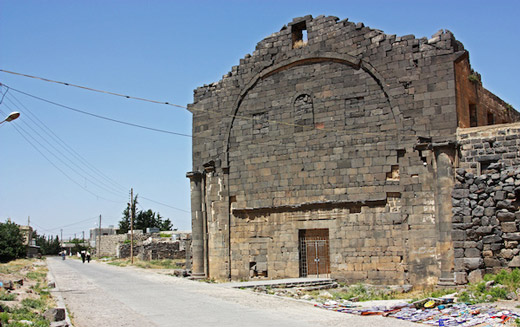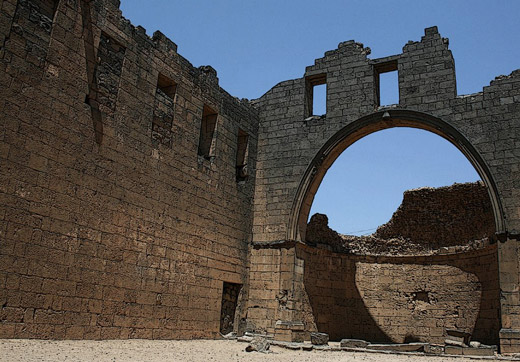Last Living Sahabi of Holy Prophet (SWS)
Last Living Sahabi Tree – The Blessed Tree (Biqayawiya, Jordan)
Last Living Sahabi – A living tree (Pistacia Atlantica) which sheltered the holy Prophet (SWS) when they were 12 years of age (approx 1466 years ago) and whom the Holy Prophet (SWS) touched. The story of the account of the meeting with monk Bahira is related below the video clip and photos from tenthousandfilms:
The tree which shaded Rasoolullahi (صلى الله عليه و سلم) is miraculously preserved by Allah for all this long period. It is the lonely tree available for around hundred square kilometers in that inhospitable desert north of Jordan.
A meditation on the themes of love of the Prophet (صلی اللہُ علیہِ و آلہِ وسلمِ) , veneration of holy sites, grace and symbolism. This film tells the story of the meeting between the Prophet Muhammad (لی اللہُ علیہِ و آلہِ وسلمِ) and a Christian monk named Bahira. The meeting happened in the shade of a tree. Fourteen hundred years later that same tree was discovered still alive in the northern deserts of Jordan. The only tree alive in hundreds of square miles of emptiness. This tree is a link to the life of the Prophet and a place of pilgrimage today…
Master of the Universe (SWS)
Consequently, this uncle, whom he loved so much, was going to be separated from him for some period of time. However, how was he going endure this? Years ago, he had lost both his honorable father and saintly mother at the end of two journeys. Now, his guardian, Abu Talib (RA), was going to set off on a journey and be separated from him for days. How was his gentle and delicate soul going to bear this separation?
Like Abu Talib (RA), the members of the household were also afraid that something would befall upon the Master of the Universe (صلى الله عليه وسلم), and for that reason, they did not want him to embark on this journey. However, our Holy Prophet (صلى الله عليه وسلم) wholeheartedly wanted to go with his uncle. He was left with no choice but to open up to his uncle after having been sad for days. He could not help speaking to his uncle in the following manner with a longing and sad tone:
“My Dear Uncle! Where and with whom are you leaving me? I neither have my mother nor my father here with me.”
Our Holy Prophet’s (صلى الله عليه وسلم) teardrops decorated these words like a flower. Even the most hardened of hearts, let alone Abu Talib (RA), who wholeheartedly loved his nephew, would be unable bear the Master of the Universe’s sorrow.
Abu Talib (RA) immediately changed his mind upon hearing these expressions that had inflamed his feelings of compassion. The Master of the Universe (صلى الله عليه وسلم) was able to go with his uncle; thus, his heart was filled with happiness after this decision had been made. The preparations were complete and he joined the caravan together with his uncle.
Monk (Georges) Sergius Bahira
Bahira’s Observation and Evaluation
There was a priest by the name of Georges Bahira who lived in a small monastery that was close to the market of Busra. [1]
At that time, this priest was a reputable scholar among Christians. There was a book in the monastery and those who worshipped at that monastery and read from that book would become the most knowledgeable of Christians.
Until that time, every priest had benefited from this book. [2]
The Qurayshi procession of trade lodged in close proximity to this priest’s monastery as they had done every year. What was strange was that Bahira, who had not interacted with anyone from the procession in the past years, was now showing an unexpected interest in the procession and had arranged a feast for them. Why had this feast and attention been given? This was the question that got the procession thinking.
The Wise Bahira had witnessed some peculiarities in the procession that he had not seen before.
While he was looking at the Qurayshi procession, he had noticed a cloud shading the Master of all Masters (صلى الله عليه وسلم).When the procession came and lodged underneath a tree, he observed the same cloud shading the tree and the tree’s branches bending before the Radiant Child to provide shade for him.
Bahira, who had seen these peculiarities, wanted to invite them for a meal. He sent the Meccans the following notice:
“Oh Qurayshis! I prepared a meal for you. I want all of you: the elderly, the young, the free, and the enslaved to come”. The Qurayshi merchants noticed Bahira’s unusual attitude. They wondered what the reason was and asked, “Oh Bahira, by God, your mood is different today. We stop by you each time we come. You have never done something like this for us before. What is the matter?”
Bahira did not disclose his secret and made do with this answer, “Yes, you are right, but after all, you are my guests. For that reason, I wanted to host and have you eat. Please come and help yourselves!”
They accepted the invitation and sat at the dinner table. However, there was an individual from the procession who was absent. Bahira was looking for the Master of the Universe (صلى الله عليه وسلم).
Since he was the youngest, the Radiant Child had been charged with the duty of keeping an eye on the procession’s belongings; thus, he was sitting by the tree.
Bahira was busy with eying everyone at the dinner table from head to toe. However, none of them had the disposition of the Radiant Child that he was looking for. He asked, “Is there anyone who has not come to the meal? Is there someone who has been left behind?” They answered, “No, Bahira, there is no one who has accepted your invitation and then did not come. Only a child was left behind to wait on our belongings.”
Bahira, who had examined the Holy Books and learned the characteristics and signs of the last Prophet from them, insisted that he come as well.
The Qurayshi merchants could not refuse Bahira’s persistent request; so, they went and brought the Master of the Universe (صلى الله عليه وسلم). While the Master of the Universe (صلى الله عليه وسلم) was busy eating his meal at the table, Bahira’s entire attention and amazement was on him. He was eying his every move and condition. Bahira had found what he was looking for and had reached his goal. The Radiant Child’s behavior and every action perfectly matched the written descriptions in the book next to him. The meal was finished and while everyone was dispersing from the table, Bahira leaned down to the Master of the Universe’s (صلى الله عليه وسلم) ear and said, “Look, young man. I want you to answer the questions that I am going to ask you about Lat and Uzza.” There was an expression of discomfort and hate in the Radiant Child’s eyes, “Please do not want anything from me on behalf of Lat and Uzza. By God, there is nothing that I hate more than them”.
Bahira retracted his first request. “In that case, Answer the questions I am going to ask you for the sake of Allah”. Our Holy Prophet (صلى الله عليه وسلم) replied “Ask whatever you wish”.
Bahira was bewildered by all the answers that he received to his questions because they exactly matched everything that he knew about the Last Prophet. Lastly, he looked at the Master of the Universe’s back and saw the seal of Prophethood. Bahira’s conviction was now certain and without doubt: This youth was the long-awaited Last Prophet (صلى الله عليه وسلم).
Bahira and Abu Talib (RA) Face-to-Face
After his recognition, Bahira went to our Holy Prophet’s (صلى الله عليه وسلم) uncle, Abu Talib (RA).
The following conversation took place between the two:
“What relation do you have to this child?”
“He is my son”
“No, he is not your son because this child’s father is not supposed to be living.”
“Yes, you are correct. He is my nephew, not my biological son”.
“Well, what happened to his father?
“He passed away while this child’s mother was pregnant.”
“Yes, you have told the truth.”
Everything was now evident and definite for Bahira. Finally, Bahira gave the following advice to our Holy Prophet’s uncle (صلى الله عليه وسلم), which showed that he was a man who thought and spoke rightfully:
“Immediately take your nephew back to your homeland. Protect him from the jealous Jews. By God, if the Jews see this child and notice what I have noticed, then they will try to inflict harm upon him because your nephew is going to attain a great reputation and glory in the future. Do not stay here anymore. Be sure to take him back immediately.” [3]
Upon hearing this advice, Abu Talib sold his goods there and returned to Mecca together with his glorious nephew. [4]
- Bahira’s real name was either Jarjis or Georges. European historians call him “Sergius”. He was once a Jewish scholar but then accepted Christianity. (Sirah, 1.191 footnote:1)
- Sirah, 1/191
- ibid, 1/191-194; Tabaqat, 1/153-155; Ansab, 1/96-98; Tabari, 1/194-195
- 4. Sirah, 1/194; Tabaqat, 1/155; Ansab 1/97
Ibn Hisham:
When the Messenger of Allâh (صلى الله عليه وسلم) was twelve years old (42 BH/583 CE), he went with his uncle Abu Talib (RA) on a business journey to Syria. When they reached Busra (which was a part of Syria, in the vicinity of Howran under the Roman domain) they met a monk called Bahira (his real name was Georges), who showed great kindness, and entertained them lavishly. He had never been in the habit of receiving or entertaining them before.
He readily enough recognized the Holy Prophet (صلى الله عليه وسلم) andsaid while taking his hand:
“This is the master of all humans. Allâh will send him with a Message which will be a mercy to all beings.”
Abu Talib (RA) asked: “How do you know that?”
He replied:
“When you appeared from the direction of ‘Aqabah, all stones and trees prostrated themselves, which they never do except for a Prophet. I can recognize him also by the seal of Prophethood which is below his shoulder, like an apple. We have got to learn this from our books.”
He also asked Abu Talib to send the boy back to Makkah and not to take him to Syria for fear of the Jews. Abu Talib obeyed and sent him back to Makkah with some of his men servants.
[Ibn Hisham 1/180-183; Za’d Al-Ma’ad 1/17]
—
Muḥammad ibn Ishaq ibn Yasār (b.85 AH /704 CE) (d.150–153 AH)(767CE–770CE)
Abu Muhammad ‘Abd al-Malik bin Hisham (d.218AH -833CE)
{Ibn Hisham 1/180-183; Za’d Al-Ma’ad 1/17} Edited the biography of The Holy Prophet صلى الله عليه وسلم written by Ibn Ishaq whos’s work is lost and is now only known in the recessions of Ibn Hisham and al-Tabari.
Abu Ja’far Muhammad ibn Jarir al-Tabari (b.224H-d.310H)(838CE–923CE)
